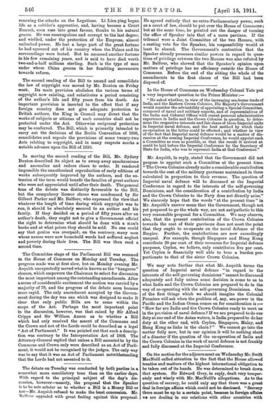The debate on Tuesday was conducted by both parties in
a somewhat more conciliatory tone than on the earlier days. With regard to the principal subject of the day's dis- cussion, however—namely, the proposal that the Speaker is to be sole arbiter as to whether a Bill is a Money Bill or not—Mr. Asquith refused to make the least concession. Mr. 13alfrmr appealed with great feeling against this proposal. He agreed entirely that no extra-Parliamentary power, such as a court of law, should be put over the House of Commons ; but at the same time, he pointed out the danger of turning the office of Speaker into that of a mere partisan. If the tribunal were a Joint Committee of the two Houses, with a casting vote for the Speaker, his responsibility would at least be shared. The Government's contention that the Speaker already possesses similar powers in regard to ques- tions of privilege oetween the two Houses was also refuted by Mr. Balfour, who showed that the Speaker's opinion upon matters of privilege has no efficiency outside the House of Commons. Before the end of the sitting the whole of the amendments to the first clause of the Bill had been disposed of.




































 Previous page
Previous page